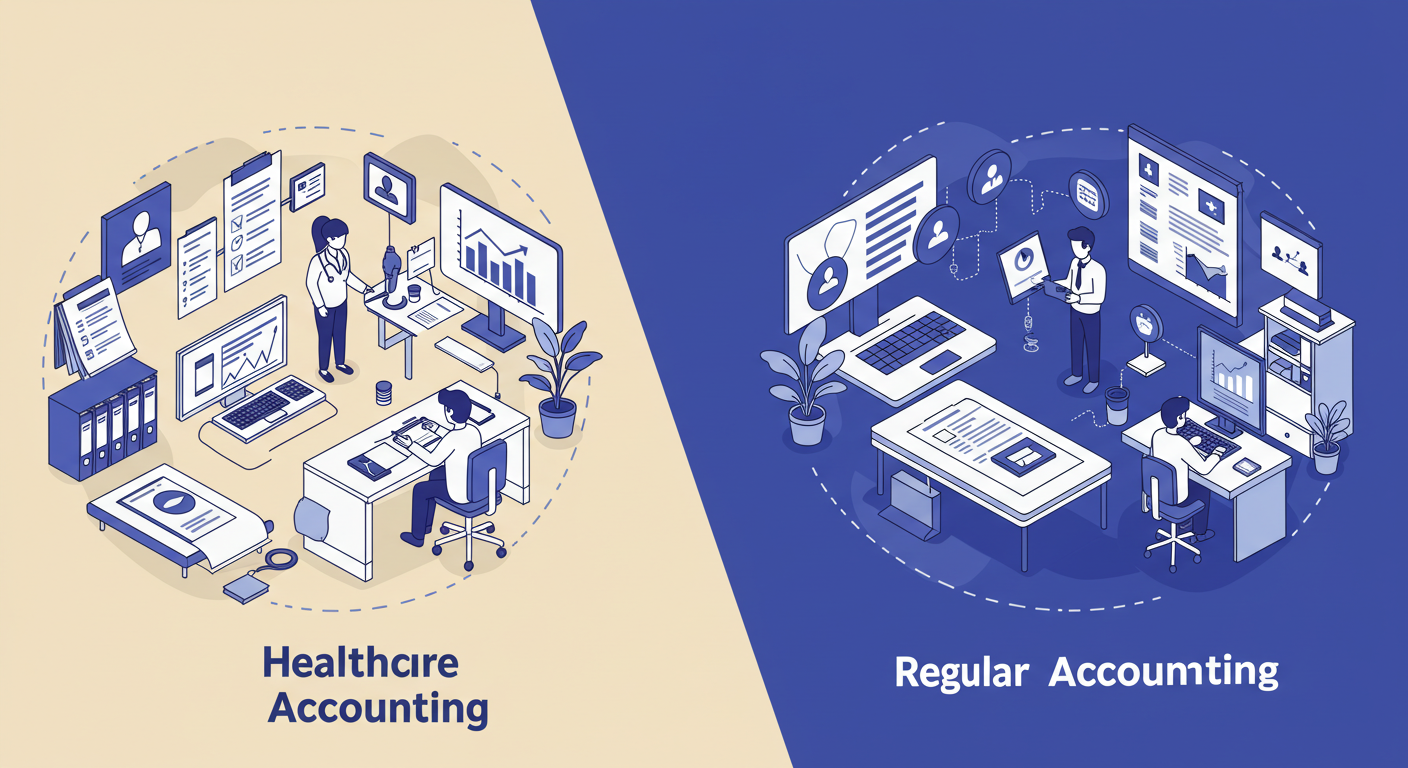Accounting is never one-size-fits-all. There are different industries that face unique challenges, and healthcare is not an exception. As we know that regular accounting focuses on recording transactions. Moreover, through it, one prepares statements, and makes sure compliance. In healthcare accounting this adds extra layers of complexity. It includes aspects such as patient billing, insurance claims, strict regulations, and unique cost structures.
If you’re a healthcare provider, clinic owner, or a person who runs a private practice, then you might wonder: how is healthcare accounting actually different from standard business accounting. So, let’s break it down.
1. Patient Billing vs. Simple Invoicing
In regular businesses, invoicing is straightforward. For instance, a person has to sell a product or service, raise an invoice, and wait for payment. But healthcare accounting is more complex than that.
Healthcare providers don’t just deal with patients directly. There payments involve insurance companies, government healthcare schemes, and third-party payers. If a person reconciles these different sources of revenue then this requires detailed tracking.
For example, in private clinics, an invoice might include consultation fees, lab charges, and follow-up costs. All of these are billed differently. In contrast, a retail store only deals with one payment per purchase. This makes healthcare revenue recognition much trickier.
2. Revenue Cycle Management
Another aspect is about earning an income because then regular accounting records that income. But in healthcare, the “revenue cycle” is much longer.
From patient registration to treatment, insurance claim submission. But when it comes to final statement, it can take weeks or even months for the arrival of the payments for the arrival. Thus, the medical accountants need to manage the cycle carefully; in order to avoid cash flow gaps.
That’s why many practices hire specialist accountants who understand healthcare revenue cycles. Another aspect is that they also make sure to follow up claims, and records the payments correctly. Furthermore, if there is a delay in reimbursements then don’t disrupt operations.
3. Heavier Regulatory Compliance
All businesses must comply with tax rules and reporting standards. But healthcare organisations face stricter oversight. The reason is that they handle sensitive patient data and public safety.
In this regard, healthcare and dental accountants must align financial reporting not just with HMRC and Companies House. But they also need to do it with healthcare-specific regulators. This includes NHS contractual requirements, Care Quality Commission (CQC) standards, or guidelines. All of these are linked to medical insurance providers.
In contrast, a regular business for instance, a consultancy firm focuses mainly on company accounts and tax returns. Moreover, they do it without additional compliance layers.
4. Cost Allocation and Complexity
Regular accounting often categorises expenses into broad buckets. There are many things included in the broad buckets; that include rent, salaries, utilities, marketing. Healthcare accounting, however, goes deeper.
Another aspect is costs. One must often allocate the costs by department (surgery, radiology, admin) or by type of treatment. For example, a hospital may want to know if orthopaedics is more profitable than dermatology. This level of cost-tracking helps management make decisions about resources and future investment.
However, if you don’t have any precise allocation, then it’s difficult for healthcare providers to identify profitable areas or spot services that drain the resources.
5. Managing Non-Profit and Public Healthcare Entities
Another key difference is that many healthcare organisations operate as non-profits or within the public sector.
But the situation here is different than the private businesses that focus on profit margins. These entities focus on sustainability and compliance with funding rules. Accounting for grants, donations, and restricted funds requires additional expertise.
For instance, a private company tracks ROI for shareholders. But a healthcare charity must track how they are spending donations in line with donor requirements. This adds another layer of responsibility to healthcare accounting.
6. Payroll and Staffing Complexities
Payroll is a challenge in most businesses. But in the healthcare sector, they take it to another level.
When it comes to clinics, hospitals, and care homes, they employ a wide mix of staff. This mix includes full-time doctors, part-time nurses, administrative teams, and sometimes contractors. Other than that, overtime, night shifts, and on-call allowances complicate payroll further.
Healthcare experts, such as pharmacist accountants, need to make sure that wages are accurate. Moreover, they also need to take care of management of pensions. Also, maintenance of compliance with employment law also needs to be taken into consideration. In contrast, when it comes to a small retail business, then it usually have only one payroll structure for all employees.
7. Importance of Financial Forecasting
Healthcare organisations must plan ahead for expensive investments. The investments include medical equipment, new facilities, or technology systems. However, when it comes to the costs, they are quite significant and often financed over several years.
Due to this, a strong emphasis by the healthcare accountants is on forecasting and scenario planning. For instance, mostly, care home accountants model out costs, expected patient demand, and potential risks like staff shortages or policy changes.
As we know that all businesses benefit from forecasts, but when it comes to healthcare, it relies on them heavily because financial risks are so high.
Conclusion
So, the major question is how healthcare accounting is different from regular accounting. In simple words, it’s more complex, more regulated, and more specialised. It requires expertise in patient billing, insurance claims, cost allocation, compliance, and long-term planning.
For healthcare providers, it is important to choose an accountant who understands these nuances. A generalist accountant may handle the basics. But only a specialist can deal with the unique financial challenges of the healthcare sector.
If you’re running a healthcare practice in the UK, think beyond “regular accounting.” The right financial partner won’t just balance the books. But they’ll help you build a sustainable, compliant, and profitable healthcare business.

